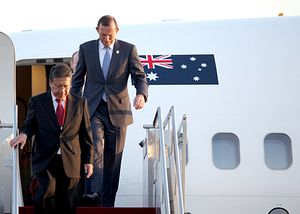Australian Prime Minister Tony Abbott and Canada’s Prime Minister Stephen Harper are two leaders cut from the same conservative political cloth. And the two saw eye to eye on climate change policy this week, when meeting as a part of Abbott’s European and North-American tour.
During a joint-press conference Abbott flagged the building of a center-right alliance of nations with common views led by Australia, Canada and the U.K., also including New Zealand and India. It is believed the group would be user to counter Obama’s recent push for climate change action to be placed on the global agenda.
The announcement may pave the way for a potentially frosty reception at the White House for Abbott later this week if the issue of climate change is discussed.
U.S. officials have reportedly been pushing Australia to put climate change on the agenda for the November G20 meeting in Brisbane, but Australia has so far refused. “Energy efficiency” will be discussed at the summit and Abbott has said he wouldn’t be surprised if climate change “came up” during those conversations. But the Australian prime minister has also said that the G20 was a place to discuss economic issues and that climate change should be discussed at the UN.
At a press conference in Canada this week Abbott applauded Obama’s recent announcement that he would aim to reduce emissions from U.S. power stations by 30 per cent compared to 2005 levels by 2030, and linked it to his own “direct action” policies at home.
Abbott’s Liberal Party is set to remove current legislation in Australia that charges businesses for high emissions, a deeply controversial law brought in by the previous Labor government. In its place will be a “direct action” approach that involves paying companies to reduce their emissions and charging companies who go over a government-set emissions rate.
The approach has been widely panned by environmental experts as ineffective. The Liberals maintain that the policy will keep them on track to the goal of cutting Australia’s emissions by 5 per cent by 2020.
In the past Abbott has been accused of denying climate change. He has implied that climate change may not be anthropogenic and said, “I don’t think we can say that the science is settled here.”
Last week, Obama announced a plan to cut emission by setting targets for each state to reduce emissions through their own choice of mechanisms. That was followed by news that China would set an absolute cap on carbon emissions and outline ways to reduce emissions in the next five-year plan.
With the world’s two biggest economies unveiling long-overdue policies to tackle the issue, Abbott, Harper, and an alliance of other conservative leaders may be the last obstacle to momentum for a global protocol.

































